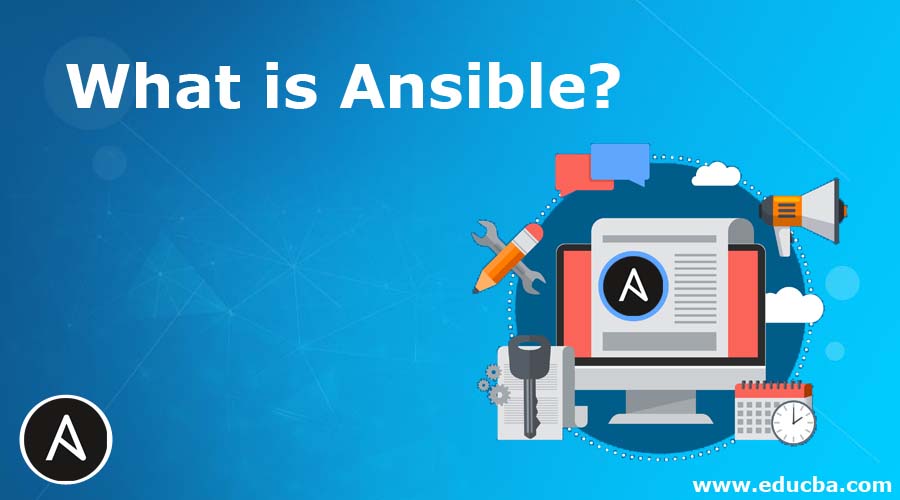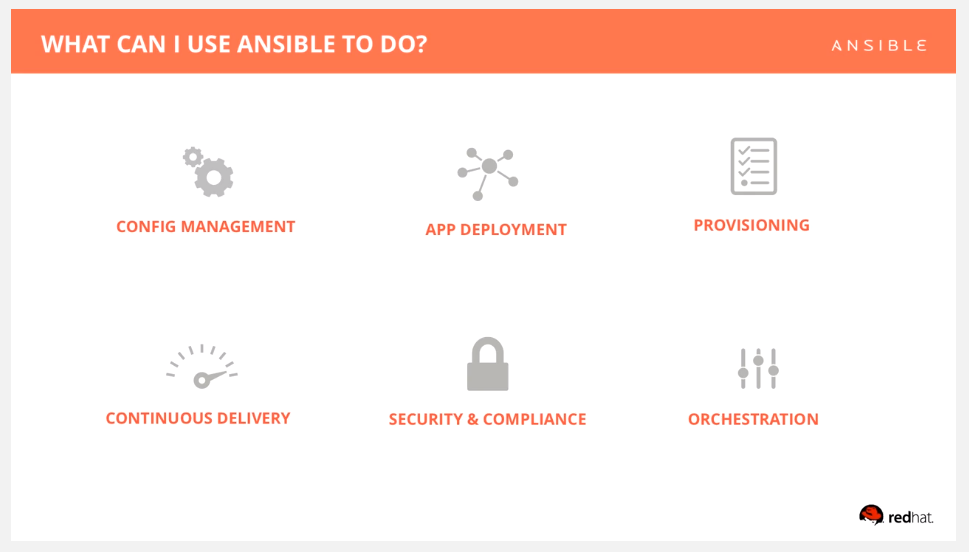Updated June 23, 2023

Introduction to Ansible
Ansible is an open-source automation framework (or platform) used for IT tasks such as software deployment, configuration management, and infra services and supply orchestration. Automation is crucial today, with overly complex IT environments that often need to be scale-up too quickly for system managers and designers to keep abreast of everything manually. Automation simplifies complex tasks, allowing developers to concentrate on other tasks that add value to an organization and not just make developer jobs better managed.
Understanding
It is simple, powerful, and agentless. The biggest differentiator between Ansible and other tools lies in the architecture; it works on the “Push” model, i.e., no additional software must be installed on the server. It manages remote connections over SSH (Linux & Unix) or WinRM (windows) by default.
Below is this architecture diagram of Ansible:
Let’s see the functionality of the individual components in detail.
- Ansible automation engine encompasses an Inventory, API, modules, and plugins.
- Ansible Playbook: It leverages the playbook for IT infrastructure automation and orchestration. This playbook consists of an automation task that serves as an input to the Ansible automation engine, which describes how a particular piece of automation will work.
- This playbook consists of a series of “play” which defines the automation task across a set of hosts known as “Inventory”. Each ‘play’ consists of multiple tasks that can serve one or more hosts present in the inventory. All these tasks made a call to an Ansible module, which is a small piece of code that performs a specific task.
- A typical task example could be installing software or placing a configuration file on the server. A more complex task could be spinning up the entire Cloud Formation infrastructure in Amazon EC2.
- It comes with hundreds of modules ranging from managing network devices and simple configuration management to modules for maintaining infrastructure on every cloud provider.
- These modules first check whether they need to execute the task. For instance, if an ansible task is to start a Tomcat server, it will only get completed if it is not running already. This phenomenon is termed “Idempotency”, which allows execution configuration repeatedly without any mayhem.
- The playbook tasks can also be reused by organizing them into reusable units known as “roles”. You can easily leverage these roles to perform redundant tasks, such as applying common server configuration across the development, UAT, and production servers.
What can you do with Ansible?
With this, you can automate the below-mentioned tasks.

Suppose you have a Java web application that must be deployed in multiple servers, i.e., dev, UAT, and prod. To deploy the war file, first, you need to set up the webserver and database server on all the machines. Also, the same SQL scripts need to run in all the databases to set up the database. Now it doesn’t make sense to perform this redundant task manually.
With this, all you need to do is to write simple tasks in the playbook, and Ansible will perform these redundant tasks for you.
Required Skills
Unlike Puppet & Chef (automation tool like Ansible), which requires knowledge of Ruby, you don’t need to learn any complicated programming language with Ansible. It uses YAML, a high-level human-readable language that IT Admin can easily understand. Also, most common tasks are available as a playbook in the Ansible Galaxy Community, which you can extend as required.
Why Should we Use Ansible?
- Using this, you can cut down specific processes from hours to minutes.
- It eliminates repetitive tasks.
- It saves time and improves productivity.
- Fewer mistakes and errors.
- Increase accountability and compliance.
Who is the Right Audience for Learning these Technologies?
You must be thinking that this technology is related to IT Infrastructure and Maintenance, which is usually taken care of by the IT Admin or the deployment team, and you being a developer, don’t need to understand this but let me break this stereotype. As you know, in DevOps, development and operations work is integrated, providing a stable environment for both development and operations. Thus a developer must understand the task written in the playbooks. Suppose there is any change in the development environment. In that case, he/she should be capable of making changes in the playbook for other environments accordingly for a smooth orchestration of the application lifecycle.
How will this Technology help you in Career Growth?
It is a must-have technology in your resume. Nowadays, every other company is trying to automate all the processes they can to increase the overall productivity and efficiency of the application and resources. Enterprise applications, typically deployed on different servers across the globe, require constant server configuration and management, which requires a good amount of time and effort. If you have very good knowledge of automation tools like Ansible and can write a playbook to automate this redundant task, this will set you apart and helps you in your career growth.
Conclusion
After reading this article, you must have a clear understanding of what Ansible is, what Ansible is capable of, and how you can improve your project’s overall efficiency and productivity by implementing Ansible. Check the white paper and sample playbooks available at the official Red Hat Ansible website to investigate this topic.
Recommended Articles
We hope that this EDUCBA information on “What is Ansible?” was beneficial to you. You can view EDUCBA’s recommended articles for more information.


